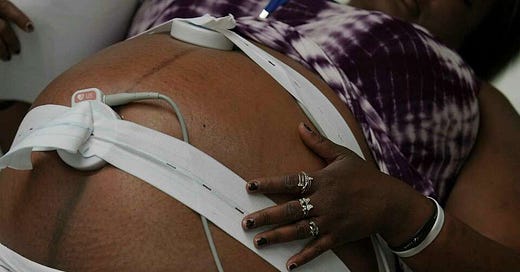N.Y.'s maternal mortality rate is bad. What else can the state do?
And New York's highest court will hear a case challenging New York's court system.
Good afternoon — it’s Friday and National Chucky Day.
In today’s CapCon:
Maternal mortality in New York is more frequent than you might think
Read the stories of three state lawmakers who had their own experience
And find out what else they want to do about it
A lawsuit challenging top court officials heads to N.Y.’s highest court
New Bills of Note: healthy birth grants, homeless housing caps
Bills Passed But Pending: doulas in the OR, CPS training
❗CapCon Note: It’s Friday, which means it might be payday for you. You don’t have to spend it on CapCon. We’ll give you 30 days free. Click here for that free trial.
🐣 Maternal mortality in N.Y. is high and it’s worse for Black mothers
Assemblywoman Michaelle Solages felt the knife cut into her when doctors performed an emergency cesarean section for her second child. The pain was so great that she passed out.
Sen. Samra Brouk spent four days in the hospital when she had her first child but it was her doula that ultimately prepared her body to give birth.
And Assemblywoman Rodneyse Bichotte Hermelyn was turned away by a hospital when she was in preterm labor. She made it to a smaller community hospital but her child died two hours after birth.
Those women have two things in common: they’re all parents and they’re all Black.
New York officials often pride themselves on the world-class hospitals and medical facilities that operate across the state. A handful of hospital systems dominate downstate while other high-ranked providers are scattered above the Bronx.
But New York ranked behind about two dozen other states in maternal mortality last year, according to the state Department of Health. There were 18.5 deaths for every 100,000 live births from 2018 to 2020, the latest state data available.
Here’s where it gets worse: Black women die at five times that rate, the agency found, and about 74 percent of pregnancy-related deaths had at least some chance of being prevented.
That’s why members of the state Legislature — Black women in particular — have carried and passed measures in recent years aimed at curbing that trend.
Some were recently signed, like a bill to allow pregnant women to enroll in health insurance at any time without a penalty, and another that requires insurance coverage for prenatal vitamins.
But lawmakers say they want to build on that progress next year, including with measures that fell through the cracks at the end of this year’s legislative session.
🚑 How three Black mothers were treated.
Keep reading with a 7-day free trial
Subscribe to Capitol Confidential with Dan Clark to keep reading this post and get 7 days of free access to the full post archives.






